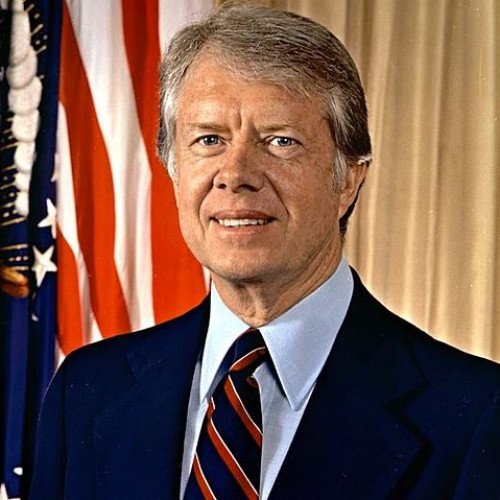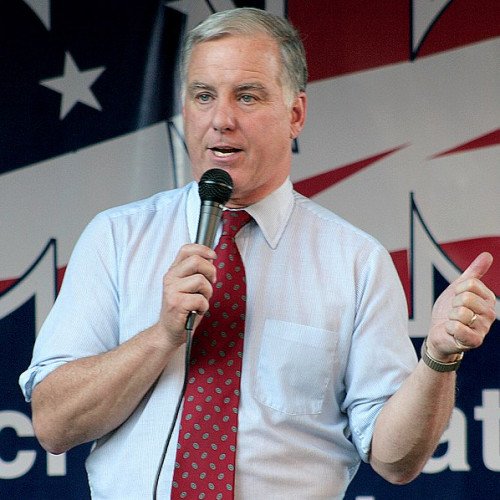Jimmy Carter VS Howard Dean

Jimmy Carter
James Earl Carter Jr. (born October 1, 1924) is an American politician and philanthropist who served as the 39th president of the United States from 1977 to 1981. A member of the Democratic Party, he previously served as a Georgia State Senator from 1963 to 1967 and as the 76th governor of Georgia from 1971 to 1975. Since leaving the presidency, Carter has remained engaged in political and social projects as a private citizen. In 2002, he was awarded the Nobel Peace Prize for his work in co-founding the Carter Center. Raised in Plains, Georgia, Carter graduated from the United States Naval Academy in 1946 with a Bachelor of Science degree and joined the United States Navy, where he served on submarines. After the death of his father in 1953, Carter left his naval career and returned home to Georgia to take up the reins of his family's peanut-growing business. Carter inherited comparatively little due to his father's forgiveness of debts and the division of the estate among the children. Nevertheless, his ambition to expand and grow the Carters' peanut business was fulfilled. During this period, Carter was motivated to oppose the political climate of racial segregation and support the growing civil rights movement. He became an activist within the Democratic Party. From 1963 to 1967, Carter served in the Georgia State Senate, and in 1970, he was elected as Governor of Georgia, defeating former Governor Carl Sanders in the Democratic primary on an anti-segregation platform advocating affirmative action for ethnic minorities. Carter remained as governor until 1975. Despite being a dark-horse candidate who was little known outside of Georgia at the start of the campaign, Carter won the 1976 Democratic presidential nomination. In the general election, Carter ran as an outsider and narrowly defeated incumbent Republican President Gerald Ford. On his second day in office, Carter pardoned all the Vietnam War draft evaders by issuing Proclamation 4483. During Carter's term as president, two new cabinet-level departments, the Department of Energy and the Department of Education, were established. He established a national energy policy that included conservation, price control, and new technology. In foreign affairs, Carter pursued the Camp David Accords, the Panama Canal Treaties, the second round of Strategic Arms Limitation Talks (SALT II), and the return of the Panama Canal Zone to Panama. On the economic front, he confronted stagflation, a persistent combination of high inflation, high unemployment and slow growth. The end of his presidential tenure was marked by the 1979–1981 Iran hostage crisis, the 1979 energy crisis, the Three Mile Island nuclear accident, and the Soviet invasion of Afghanistan. In response to the invasion, Carter escalated the Cold War when he ended détente, imposed a grain embargo against the Soviets, enunciated the Carter Doctrine, and led a 1980 Summer Olympics boycott in Moscow. In 1980, Carter faced a challenge from Senator Ted Kennedy in the primaries, but he won re-nomination at the 1980 Democratic National Convention. Carter lost the general election to Republican nominee Ronald Reagan in an electoral landslide. He is the only president in American history to serve a full term of office and never appoint a justice to the Supreme Court. Polls of historians and political scientists usually rank Carter as a below-average president. Carter's activities since leaving the presidency have been viewed more favorably than his presidency itself. In 1982, Carter established the Carter Center to promote and expand human rights. He has traveled extensively to conduct peace negotiations, monitor elections, and advance disease prevention and eradication in developing nations. Carter is considered a key figure in the Habitat for Humanity charity. He has written over 30 books, ranging from political memoirs to poetry, while continuing to actively comment on ongoing American and global affairs such as the Israeli-Palestinian conflict.
Statistics for this Xoptio

Howard Dean
Howard Brush Dean III (born November 17, 1948) is an American physician, author, and retired politician who served as Governor of Vermont from 1991 to 2003 and Chair of the Democratic National Committee (DNC) from 2005 to 2009. Dean was a candidate for the Democratic nomination in the 2004 presidential election. His implementation of the fifty-state strategy as head of the DNC is credited with the Democratic victories in the 2006 and 2008 elections. Afterward, he became a political commentator and consultant to McKenna Long & Aldridge, a law and lobbying firm. Before entering politics, Dean earned his medical degree from the Albert Einstein College of Medicine in 1978. Dean served as a member of the Vermont House of Representatives from 1983 to 1986 and as Lieutenant Governor of Vermont from 1987 to 1991. Both were part-time positions that enabled him to continue practicing medicine. In 1991, Dean became governor of Vermont when Richard A. Snelling died in office. Dean was subsequently elected to five two-year terms, serving from 1991 to 2003, making him the second longest-serving governor in Vermont history, after Thomas Chittenden (1778–1789 and 1790–1797). Dean served as chairman of the National Governors Association from 1994 to 1995; during his term, Vermont paid off much of its public debt and had a balanced budget 11 times, lowering income taxes twice. Dean also oversaw the expansion of the "Dr. Dynasaur" program, which ensures universal health care for children and pregnant women in the state. He is a noted staunch supporter of universal health care.Dean denounced the 2003 invasion of Iraq and called on Democrats to oppose the Bush administration. In the 2004 election, Dean was the top fundraiser and front runner, prior to the Iowa caucus, for the Democratic Party presidential nomination. Although he lost the nomination to Senator John Kerry of Massachusetts, Dean pioneered Internet-based fundraising and grassroots organizing, which is centered on mass appeal to small donors which is more cost efficient than the more expensive contacting of fewer potential larger donors, and promotes active participatory democracy among the general public. In 2004, Dean founded Democracy for America, a progressive political action committee. He was later elected chairman of the Democratic National Committee in February 2005. As chairman of the party, Dean created and employed the 50 State Strategy that attempted to make Democrats competitive in normally conservative states often dismissed in the past as "solid red". The success of the strategy became apparent after the 2006 midterm elections, where Democrats took back the House and picked up seats in the Senate from normally Republican states such as Missouri and Montana. In the 2008 presidential election, Barack Obama used the 50 state strategy as the backbone of his candidacy. Dean was named chairman emeritus of the DNC upon his retirement. Since retiring from the DNC chairman position, Dean has held neither elected office nor an official position in the Democratic Party and, as of 2015, was working for global law firm Dentons as part of the firm's public policy and regulation practice. In 2013, Dean expressed interest in running for the presidency in 2016, but instead supported former Secretary of State Hillary Clinton's run for president. Dean endorsed Clinton over her competitor Senator Bernie Sanders in spite of the fact that Sanders represented the state of Vermont, where Dean had been governor.